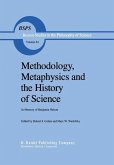This book provides a unique contribution to philosophy of science from the perspective of the practice of science. It focuses on processes that generate scientific knowledge and seeks general and universal features that characterize scientific practice; features that are inherent to the practice of science. Science is an activity, and the scientist is an agent who pursues some practice, which in one way or another engages evidence. In science, claims to knowledge are typically supported by argument that engages evidence at some point in explanation, in prediction, or indeed in any mode of presenting data and its interpretation. Thus, the practice of science includes at least three elements so that an argument can be formulated: presuppositions, modes of inference, and consequences that relate to evidence. The authors discuss in detail eight cases in chronological order with which they illustrate how commitment, methodology, and technique come into play in the practice of an individualphysicist or a group of researchers in the physical sciences. Each case highlights aspects of the roles these categories play in scientific practice, where the goal is to generate and extend scientific knowledge.
Dieser Download kann aus rechtlichen Gründen nur mit Rechnungsadresse in A, B, BG, CY, CZ, D, DK, EW, E, FIN, F, GR, HR, H, IRL, I, LT, L, LR, M, NL, PL, P, R, S, SLO, SK ausgeliefert werden.









